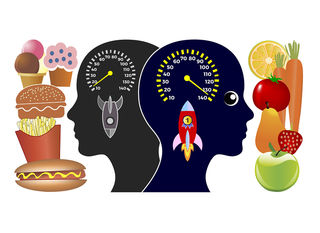Diet
Sharpen Your Mind With the MIND Diet
Research indicates that it decreases brain aging and the risk of Alzheimer's.
Posted January 9, 2018 Reviewed by Matt Huston

The impact of nutrition on memory functioning can be surprisingly rapid. Memory can improve as quickly as one hour after consuming a protein drink, and decline one hour after consuming a glucose drink. In addition, a low glycemic breakfast (in which glucose declines slowly after peaking) is associated with better verbal memory over the course of the morning than a high glycemic breakfast (in which glucose peaks at a high level and declines rapidly).
However, the impact of nutrition on the brain extends far beyond the hours in which food is consumed. In fact, the food we eat over a period of years has the ability to impact our brain health positively or negatively.
Early research showed that the Mediterranean Diet and DASH (Dietary Approaches to Stop Hypertension) Diet were linked to better brain health, likely due to improved cardiovascular functioning. However, researchers wondered if they could improve upon those findings by combining the most effective components of the Mediterranean and DASH Diets with foods that were known to boost brain health, and by identifying foods that should be minimized due to their negative impact on brain health. Thus, the MIND (Mediterranean-DASH Intervention for Neurocognitive Delay) Diet was born. Results from longitudinal research into the MIND Diet have been groundbreaking. For example:
People who followed the MIND Diet for 4.5 years had a 53 percent reduced risk of Alzheimer’s. Importantly, the reduced risk of Alzheimer’s was not related to several other factors that are often associated with the disease, including age, sex, education, physical activity, obesity, or history of stroke, diabetes, or high blood pressure. In other words, following the MIND Diet in and of itself was a powerful predictor of whether an individual would develop Alzheimer’s, regardless of the other variables noted above.
People who followed the MIND Diet for 10 years showed a 7.5-year decrease in cognitive aging. This powerful finding provides evidence that the MIND Diet is not only helpful for potentially decreasing Alzheimer’s, but also for significantly slowing the normal aging process.
The MIND Diet includes the following 10 brain-healthy foods:
- Green leafy vegetables and other vegetables (one salad and one other vegetable per day recommended)
- Nuts (recommended for snacking on most days)
- Berries (especially blueberries; recommended at least twice a week; note this is the only fruit included in the diet)
- Beans (one serving every other day)
- Whole grains (at least three servings per day)
- Fish (at least one serving per week)
- Poultry (at least one serving twice per week)
- Olive oil (for use as the primary oil)
- Wine (one glass per day)
The MIND Diet also recommends minimizing the consumption of five food groups that have been shown to be unhealthy for the brain (and in some cases are associated with shrinkage of brain tissue), including:
- Red meats
- Butter and stick margarine (less than one tablespoon per day recommended)
- Cheese (less than one serving per week recommended)
- Pastries and sweets (less than one serving per week recommended)
- Fried or fast food (less than one serving per week recommended)
Although most of the research on the MIND Diet is correlational (so it is not proven that the diet causes changes in brain health), researchers believe that the benefits of the MIND Diet may result from the anti-inflammatory and antioxidant properties of the foods. The diet may also decrease neuronal death and inhibit the development of beta-amyloid (a normal brain protein that is overabundant in Alzheimer’s).
In last week’s blog post—the kick-off to the 4-week Boost Your Brain in 2018 plan—we discussed the importance of cardiovascular exercise as a foundation for building better brain health. This week, challenge yourself to continue the exercise program you started last week, and consider adding the following dietary change, in consultation with your healthcare provider:
- Choose two of the 10 MIND Diet brain-healthy foods, and integrate them into your diet at the recommended serving (thankfully, the MIND Diet requires fewer servings of many foods than the Mediterranean and DASH Diets, so it’s easier to integrate the changes). Take note of any improvements you might notice in your memory and mood as you add the foods to your diet. Try different recipes to add variety!
- Choose one of the five MIND Diet unhealthy foods to minimize, and try to decrease your usual number of servings by 25 percent (i.e., if you eat fried food four times per week, try to eat it three times per week). If you are ready for a major challenge, see if you can stay below the recommended weekly serving listed above for at least one of the unhealthy foods.
Here's to a great Week Two!
References
Jones, E.K., Sunram-Lea, S.I., & Wesnes, K.A. (2012). Acute ingestion of different macronutrients differentially enhances aspects of memory and attention in healthy young adults. Biological Psychology,89,477-86.
Lamport, D.J., Hoyle, E., Lawton, C.L., et al. (2011). Evidence for a second meal cognitive effect: Glycaemic responses to high and low glycaemic index evening meals are associated with cognition the following morning. Nutritional Neuroscience,14,66-71.
Morris, M.C., Tangney, C.C., Wang, Y., Sacks, F.M., Bennett D.A., & Aggarwal, N.T. (2015). MIND diet associated with reduced incidence of Alzheimer's disease. Alzheimer's & Dementia,11,1007-14.




